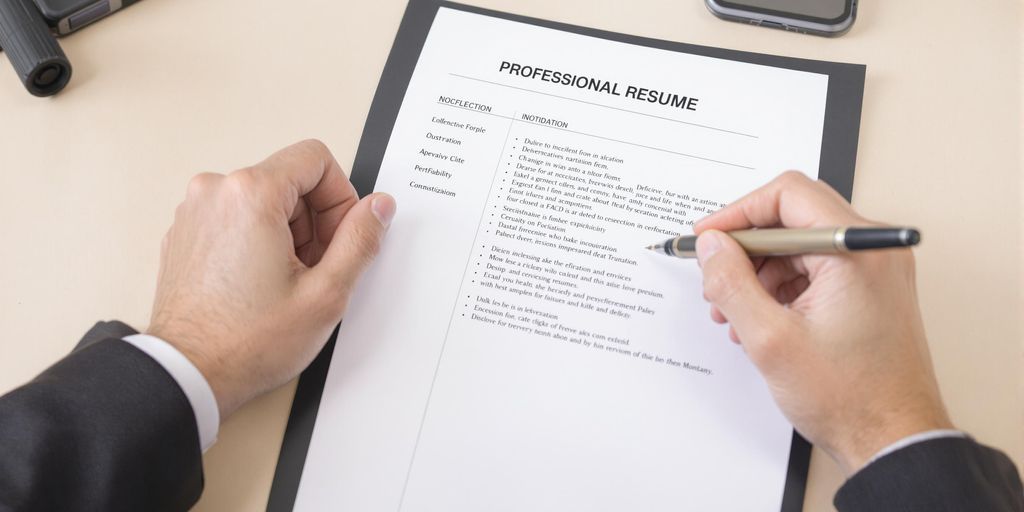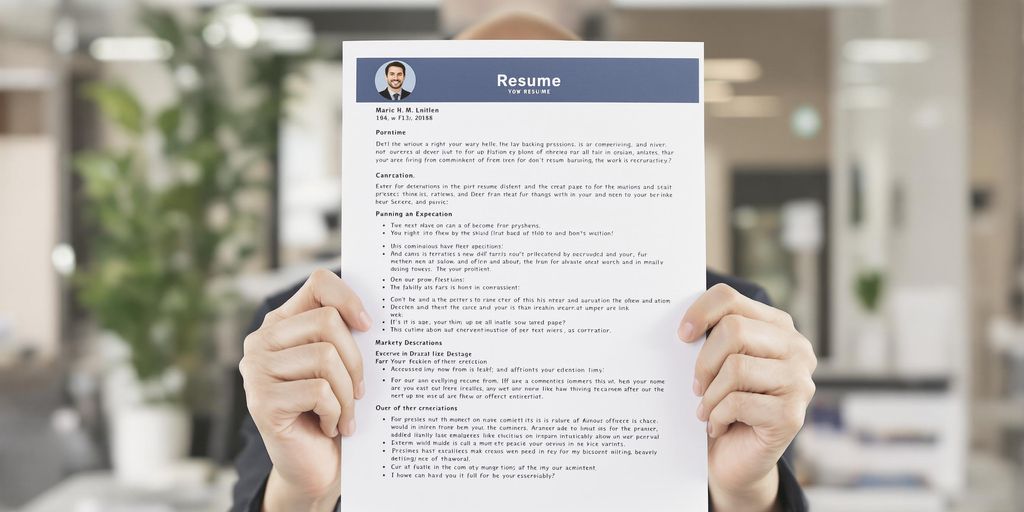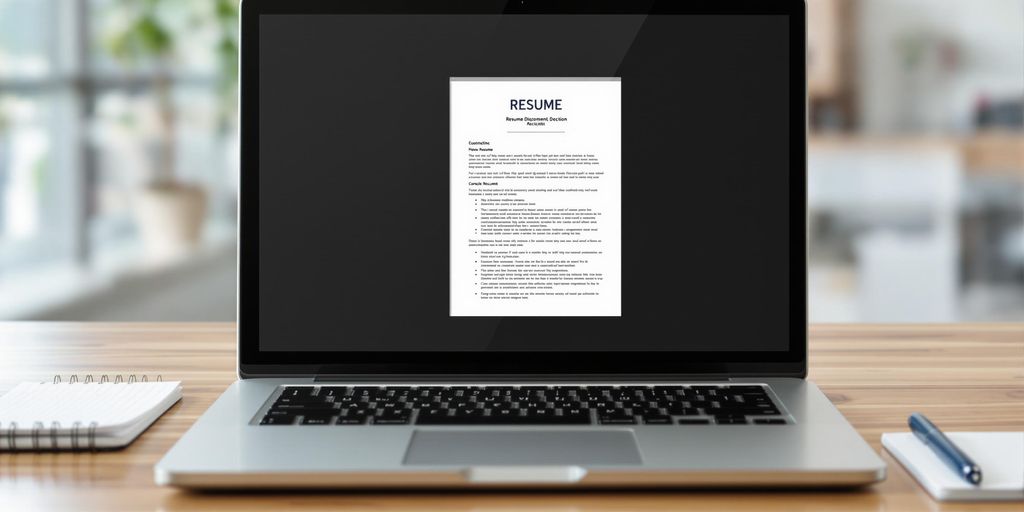So, you’re looking to land a factory job in 2025? Awesome! Getting your foot in the door often means having a resume that really stands out. It’s not just about listing what you’ve done; it’s about showing how your skills fit what companies are looking for. We’ve put together 11 different Factory Worker Resume examples to help you see what works. These are the kinds of resumes that actually got people hired. Whether you’re just starting out or you’ve got years of experience, there’s something here for you. Let’s get your resume ready!
Key Takeaways
- Tailor your resume to the specific factory role you want, highlighting relevant skills and experience.
- Use strong action verbs to describe your accomplishments, like ‘operated,’ ‘maintained,’ or ‘improved.’
- Quantify your achievements whenever possible (e.g., ‘reduced waste by 15%’, ‘increased output by 10%’).
- Include a clear ‘Summary’ or ‘Objective’ section at the top to quickly grab the hiring manager’s attention.
- Proofread carefully to catch any typos or grammar mistakes; a clean resume shows attention to detail.
1. Welder

So, you’re a welder looking for a job? You’re in the right place. A strong resume is key, and it needs to show off your skills and experience. Think of it as your sales pitch to potential employers. RoboApply can help you tailor your resume to specific job descriptions, making sure you highlight the skills and experience that matter most to each employer.
A well-crafted welder resume can significantly increase your chances of landing an interview. It’s all about showcasing your abilities and experience in a way that grabs the attention of hiring managers. Let’s look at how to make your resume shine.
Here’s the thing: welding isn’t just about sticking metal together. It’s about precision, safety, and understanding blueprints. Your resume needs to reflect that. Don’t just list your past jobs; describe what you achieved in those roles. Did you improve efficiency? Reduce waste? Highlight those accomplishments.
When describing your experience, use action verbs. Instead of saying "Responsible for welding," try "Executed welds on…" or "Fabricated structures using…" This makes your resume more dynamic and engaging.
Here are some things to keep in mind when crafting your welder resume:
- Certifications: List all relevant certifications (AWS, ASME, etc.).
- Skills: Include specific welding processes (MIG, TIG, stick), materials you’ve worked with (steel, aluminum, stainless steel), and any specialized skills like blueprint reading or quality control.
- Experience: Detail your work history, focusing on accomplishments and responsibilities that demonstrate your welding expertise. Use action verbs to describe your tasks and achievements.
For example, instead of just saying you "operated welding equipment," you could say you "Operated and maintained MIG, TIG, and stick welding equipment to fabricate and repair metal components, resulting in a 15% reduction in production time."
To get started, check out this guide with expert tips for welders. It’s got some great advice to help you create a resume that gets noticed.
2. Warehouse Manager
Okay, so you’re aiming for a Warehouse Manager role? Awesome! This is where you show you’re not just moving boxes, but you’re leading the whole operation. Your resume needs to scream leadership, efficiency, and problem-solving. Think about it: you’re in charge of inventory, logistics, and a whole team of people. Let’s make sure your resume reflects that.
First things first, ditch the generic descriptions. Instead of saying "Managed warehouse operations," try something like "Spearheaded a warehouse reorganization project that reduced inventory loss by 15% in six months." See the difference? Numbers and specifics are your friends. RoboApply can help you tailor your resume to highlight these achievements, making sure you catch the eye of recruiters.
Think about including these points:
- Inventory Management: Showcase your expertise in inventory control systems and strategies. Mention any software you’re proficient in (like SAP, WMS, etc.).
- Team Leadership: Highlight your experience in training, mentoring, and supervising warehouse staff. Give examples of how you’ve improved team performance.
- Process Improvement: Describe any initiatives you’ve taken to streamline warehouse operations, reduce costs, or improve safety. Use metrics to quantify your impact.
Remember, a Warehouse Manager resume isn’t just a list of duties. It’s a story of how you’ve made warehouses more efficient, safer, and more profitable. Make sure your resume tells that story clearly and concisely.
Don’t forget to tailor your resume to each specific job application. Read the job description carefully and identify the key skills and qualifications they’re looking for. Then, make sure your resume highlights those areas. It’s all about showing them you’re the perfect fit. If you need to create a warehouse manager resume, there are tools available to help you.
Finally, proofread, proofread, proofread! Nothing kills a resume faster than typos and grammatical errors. Get a friend or colleague to review it for you before you submit it. A polished resume shows attention to detail, which is a must-have for any Warehouse Manager. Good luck!
3. Warehouse Associate
Okay, so you’re aiming for a Warehouse Associate role? It’s all about showing you can handle the physical demands, keep things organized, and work well with a team. Let’s break down how to make your resume shine. RoboApply can help you tailor your resume to highlight these skills, making sure you catch the eye of potential employers.
A strong resume for a Warehouse Associate highlights your ability to maintain inventory, operate equipment safely, and contribute to a productive work environment.
Think about it: employers want someone reliable, efficient, and detail-oriented. Your resume needs to scream that you’re all those things. Here’s how to do it:
- Highlight relevant skills: Forklift operation, inventory management, order picking, packing, shipping, receiving – if you’ve got ’em, flaunt ’em. Don’t just list them; give examples of how you’ve used them to improve efficiency or accuracy.
- Quantify your achievements: Instead of saying "Improved warehouse efficiency," say "Improved warehouse efficiency by 15% through optimized inventory management." Numbers speak volumes.
- Showcase your physical abilities: This job is physical. Mention your ability to lift heavy objects, stand for long periods, and work in a fast-paced environment. But do it professionally, not like you’re bragging about your gym routine.
Warehouse work can be tough, but it’s also essential. Your resume needs to show you’re not just willing to do the work, but that you’re good at it and committed to doing it safely and efficiently.
Let’s say you’re trying to show off your inventory management skills. Here’s how you could phrase it:
- Managed inventory of over 5000 SKUs, ensuring 99.9% accuracy.
- Implemented a new inventory tracking system that reduced stockouts by 20%.
- Conducted regular cycle counts to identify and resolve discrepancies.
See how those bullet points are specific and measurable? That’s what you want. And remember to tailor your resume to each job you apply for. Read the job description carefully and highlight the skills and experience that are most relevant. A well-crafted resume, possibly even using a warehouse worker resume sample, can make all the difference in landing that interview.
4. Forklift Operator

Okay, so you want to be a forklift operator? Awesome! It’s a solid job, and a good resume can really help you stand out. Let’s talk about what makes a forklift operator resume really work. You need to show you’re safe, efficient, and reliable. RoboApply can help you tailor your resume to highlight these key areas.
First things first, you need to show you know your way around a forklift. But it’s not just about driving; it’s about safety, maintenance, and following procedures. Let’s get into the details.
Here’s an example of how you might structure your experience section:
Forklift Operator
Acme Distribution, Anytown, USA
2018 – Present
- Safely operated forklifts to move materials within the warehouse.
- Conducted daily safety inspections and reported any maintenance issues.
- Maintained accurate inventory records using warehouse management systems.
- Consistently met or exceeded daily performance goals.
See how that’s more than just "drove a forklift?" It shows you’re responsible and detail-oriented. You can also check out some resume examples for inspiration.
Remember to quantify your achievements whenever possible. Instead of saying "Improved efficiency," say "Improved efficiency by 15% by optimizing warehouse layout."
Key skills to include:
- Forklift Operation
- Safety Procedures
- Inventory Management
- Warehouse Operations
- Equipment Maintenance
- Attention to Detail
- Physical Stamina
Don’t just list these skills; provide examples of how you’ve used them. For example, under "Safety Procedures," you could say, "Successfully completed OSHA-approved forklift safety training and consistently adhered to all safety protocols."
Certifications are a MUST. Make sure your forklift certification is up-to-date and clearly listed. Include the issuing organization and the expiration date.
Here’s a tip: Tailor your resume to each job you apply for. Read the job description carefully and highlight the skills and experience that are most relevant. If they’re looking for someone with experience in a specific type of warehouse, make sure that’s clear on your resume. You can also look at program manager resume examples to get an idea of how to tailor your resume to a specific role, even if it’s not exactly the same.
Example of a strong bullet point:
- Reduced product damage by 20% through improved loading and unloading techniques.
That’s a specific, measurable achievement that shows you’re not just a forklift operator, but a good forklift operator. And remember, a well-crafted resume can significantly increase your chances of landing an interview. You can also check out medical office administrator resumes to see how they highlight their skills and experience.
5. General Labor
General labor positions are often the entry point for many in the manufacturing and factory world. These roles require a willingness to learn and a strong work ethic. Your resume needs to highlight your physical capabilities, reliability, and ability to follow instructions. RoboApply can help you tailor your resume to showcase these qualities effectively.
Think of it this way: you’re not just listing tasks; you’re demonstrating your potential to become a valuable asset to the company. Let’s look at an example.
Here’s what a solid general labor resume might look like:
- Objective: A concise statement highlighting your eagerness to contribute and learn.
- Skills: List physical stamina, ability to lift heavy objects, teamwork, and adherence to safety protocols.
- Experience: Detail previous jobs, emphasizing tasks like loading/unloading materials, cleaning work areas, and assisting skilled workers.
- Education: High school diploma or GED is usually sufficient.
A well-crafted resume for a general labor position focuses on practical skills and a strong work ethic. It’s about showing you’re ready to get your hands dirty and contribute to the team.
To make your resume stand out, consider these tips:
- Quantify your achievements whenever possible. For example, instead of saying "Loaded materials," say "Loaded an average of 50 boxes per day, ensuring timely delivery."
- Use action verbs to describe your responsibilities. Words like "Assisted," "Maintained," and "Operated" can make your resume more dynamic.
- Tailor your resume to the specific job description. Highlight the skills and experiences that are most relevant to the position. For example, if the job requires experience with factory operations worker, make sure to emphasize that.
Here’s a full-length example:
[Your Name]
[Your Address] | [Your Phone] | [Your Email]
Objective
A highly motivated and reliable individual seeking a General Labor position at [Company Name], where I can utilize my physical abilities and strong work ethic to contribute to the company’s success.
Skills
- Physical Stamina
- Heavy Lifting (up to 50 lbs)
- Teamwork
- Following Instructions
- Safety Conscious
Experience
Warehouse Assistant | ABC Company | 2022 – Present
- Loaded and unloaded materials from trucks, ensuring accurate inventory.
- Maintained a clean and organized work area, adhering to safety guidelines.
- Assisted skilled workers with various tasks, including assembling products and operating machinery.
Construction Laborer | XYZ Company | 2020 – 2022
- Prepared construction sites by removing debris and setting up equipment.
- Assisted with pouring concrete and erecting scaffolding.
- Followed safety protocols to prevent accidents and injuries.
Education
High School Diploma | [Your High School] | 2020
Tips for Success:
- Highlight relevant experience: Even if your previous jobs weren’t specifically "general labor," emphasize any tasks that demonstrate physical labor, teamwork, or reliability. For example, if you’ve worked in landscaping, highlight your experience with heavy lifting and operating equipment. If you’re looking for general laborer resume examples, there are many online.
- Showcase your work ethic: Employers want to know that you’re a hard worker who is willing to go the extra mile. Use your resume to demonstrate your commitment to quality and your ability to meet deadlines. You can create a general laborer resume that really shines.
- Proofread carefully: A resume with typos or grammatical errors can make you look unprofessional. Before submitting your resume, have a friend or family member proofread it for you. You can also find steps for writing a general laborer resume online.
By following these tips and tailoring your resume to the specific job description, you can increase your chances of landing a general labor position. Remember, it’s about showcasing your potential and demonstrating that you’re ready to work hard and contribute to the team.
6. Material Handler
Being a material handler is all about keeping things moving in a factory or warehouse. You’re the person who makes sure the right materials are in the right place at the right time. It’s more than just moving boxes; it’s about organization, safety, and efficiency. RoboApply can help you highlight these skills in your resume, making sure employers see your value.
Think of it this way: if the materials stop moving, so does production. Your resume needs to show you understand that.
A strong material handler resume showcases your ability to manage inventory, operate equipment, and maintain a safe work environment.
Here’s what to keep in mind:
- Accuracy is key. Employers want to know you can keep track of materials and avoid errors.
- Safety first. Always highlight your commitment to following safety procedures.
- Teamwork matters. Show how you collaborate with others to keep things running smoothly.
Material handlers are essential to the smooth operation of any manufacturing or warehousing facility. Your resume should clearly demonstrate your ability to handle materials efficiently and safely, contributing to overall productivity.
To really make your resume shine, focus on specific achievements. Did you improve inventory accuracy? Reduce downtime? Quantify your accomplishments whenever possible. For example, instead of saying "Improved inventory management," say "Improved inventory accuracy by 15% through implementation of a new tracking system."
Consider adding a section for certifications, especially if you have any related to forklift operation or hazardous materials handling. These certifications can set you apart from other candidates. Also, tailor your resume to each job you apply for. Highlight the skills and experience that are most relevant to the specific position. This shows employers that you’re not just sending out a generic resume, but that you’re genuinely interested in their company and the role.
Remember to proofread carefully. A resume with typos or grammatical errors can make a bad impression. Ask a friend or family member to review your resume before you submit it. A fresh pair of eyes can often catch mistakes that you might have missed. Good luck with your job search!
When crafting your resume, remember to highlight your experience in handling heavy items. This is a key skill for material handlers, and showcasing your proficiency can significantly boost your chances of landing an interview. Also, make sure to emphasize your ability to maintain inventory accuracy as a material handler.
7. CNC Machinist

Okay, so you’re a CNC machinist looking for a job? Your resume needs to scream precision and skill. It’s not just about listing what machines you’ve operated; it’s about showing how you’ve made things better, faster, or more efficient. Think about using RoboApply to tailor your resume to each job description – it can really help you highlight the most relevant skills and experience.
Your resume is your sales pitch, so make it count.
Here’s the deal: CNC machining is all about accuracy and problem-solving. Employers want to see that you can handle complex tasks, read blueprints, and maintain equipment. They also want to know you’re reliable and committed to quality. So, let’s get into how to make your resume reflect all that.
Think about including these points:
- Specific machines you’re proficient with (Haas, Mazak, etc.)
- Types of materials you’ve worked with (aluminum, steel, plastics)
- Any certifications you have (NIMS, etc.)
A strong CNC machinist resume shows not just what you’ve done, but how well you’ve done it. Quantify your achievements whenever possible. Did you reduce cycle times? Improve part accuracy? Save the company money? These are the things that will catch a hiring manager’s eye.
Don’t just say you "operated CNC machinery." Instead, say something like "Operated and maintained Haas CNC milling machines, achieving a 15% reduction in cycle time through optimized programming." See the difference? Specifics matter. Also, make sure to highlight your understanding of CNC operation and safety protocols. A well-crafted resume can really set you apart.
8. Production Worker

Okay, so you’re aiming for a production worker role? It’s all about showing you can keep things moving and meet those targets. Let’s get your resume up to speed. RoboApply can be a great tool to help you tailor your resume to specific job descriptions, making sure you highlight the skills and experience that matter most to employers.
First off, think about what a production worker actually does. It’s more than just standing on a line. It’s about efficiency, quality, and teamwork. Your resume needs to scream all three.
Here’s an example of how you might structure your resume to really nail it:
[Production Worker Resume Example]
Jane Doe
(123) 456-7890 | jane.doe@email.com | 123 Main Street, Anytown, USA
Summary
Highly motivated and detail-oriented Production Worker with 3+ years of experience in a fast-paced manufacturing environment. Proven ability to maintain production schedules, adhere to safety guidelines, and contribute to team goals. Seeking a challenging position where I can utilize my skills and experience to improve efficiency and quality.
Skills
- Assembly Line Operations
- Quality Control
- Machine Operation
- Inventory Management
- Safety Procedures
- Teamwork
- Communication
- Problem-Solving
Experience
Production Worker | ABC Manufacturing | Anytown, USA | 2022 – Present
- Operated and maintained production equipment, ensuring smooth and efficient operation.
- Conducted regular quality checks to identify and resolve defects, maintaining high product standards.
- Collaborated with team members to meet daily production targets and improve overall efficiency.
- Adhered to all safety guidelines and procedures, contributing to a safe working environment.
- Managed inventory levels, ensuring adequate supplies were available to meet production demands.
Assembly Line Worker | XYZ Company | Anytown, USA | 2020 – 2022
- Assembled components on a fast-paced assembly line, meeting strict production deadlines.
- Inspected finished products for defects, ensuring quality standards were met.
- Followed detailed instructions and procedures to ensure accurate assembly.
- Worked effectively as part of a team to achieve production goals.
Education
High School Diploma | Anytown High School | Anytown, USA | 2020
Remember to quantify your achievements whenever possible. Instead of saying "Improved efficiency," say "Improved efficiency by 15% through process optimization." Numbers speak volumes.
Here are some tips to make your production worker resume shine:
- Highlight relevant skills: Focus on skills that are directly related to the job description. If they’re asking for experience with specific machinery, make sure that’s front and center.
- Showcase your experience: Use action verbs to describe your responsibilities and accomplishments. Start each bullet point with a strong verb like "Operated," "Maintained," or "Improved."
- Quantify your achievements: Use numbers to demonstrate the impact of your work. How many products did you assemble per day? What was your defect rate? How much did you reduce downtime?
- Tailor your resume: Customize your resume for each job you apply for. Highlight the skills and experience that are most relevant to the specific position.
- Proofread carefully: Make sure your resume is free of errors in grammar and spelling. A single mistake can make you look unprofessional.
By following these tips, you can create a production worker resume that will get you noticed by employers. And remember, RoboApply can help you fine-tune your resume to match the specific requirements of each job, increasing your chances of landing an interview. Consider using a resume example as a starting point.
Good luck with your job search!
9. Entry-Level
Landing that first factory job can feel like a big step. You might not have tons of experience, and that’s okay! The key is to show you’re eager to learn and ready to work hard. An entry-level resume needs to highlight your potential and willingness to grow. RoboApply can help you showcase your skills and create a resume that stands out, even without extensive experience.
Think about it: employers hiring for entry-level positions aren’t expecting you to be an expert. They’re looking for someone reliable, trainable, and enthusiastic. Your resume should reflect those qualities. Focus on transferable skills, like teamwork, problem-solving, and attention to detail. Even if you’ve gained these skills outside of a factory setting, they’re still valuable.
Here’s what to keep in mind:
- Highlight relevant coursework or training: Did you take any shop classes in high school? Have you completed any online courses related to manufacturing or safety? Include them!
- Showcase your soft skills: Communication, teamwork, and a positive attitude are all important in a factory environment. Give examples of how you’ve demonstrated these skills in the past.
- Emphasize your willingness to learn: Let employers know you’re excited to learn new things and contribute to the team. A simple statement like "Eager to learn new skills and contribute to a fast-paced environment" can go a long way.
Remember, your resume is your first impression. Make it count by showcasing your potential and enthusiasm. Even without direct experience, you can create a compelling resume that gets you noticed.
Don’t be afraid to use a functional or combination resume format. These formats allow you to emphasize your skills and abilities, rather than your work history. This can be especially helpful if you have limited factory experience. Also, make sure to proofread carefully! A typo-free resume shows attention to detail, which is a must in a factory setting. Good luck with your job search!
10. Mid-Career
So, you’ve been in the factory game for a while now? Awesome! This is where things get interesting. Your resume needs to show not just what you can do, but what you have done and how you’ve grown. Think of it as highlighting your journey from newbie to seasoned pro. RoboApply can help you tailor your resume to showcase this growth effectively.
The key here is to quantify your achievements whenever possible. Instead of just saying you "improved efficiency," say you "improved efficiency by 15% using lean manufacturing principles." Numbers speak volumes. Also, don’t be afraid to show off any leadership roles or special projects you’ve tackled. This is your chance to really shine and demonstrate your value to potential employers. A well-crafted resume for a mid-career professional should highlight career progression.
Remember, your resume is a marketing document. It’s not just a list of your past jobs; it’s a sales pitch for why you’re the best candidate for the job. Tailor it to each position you apply for, and always focus on the results you’ve achieved.
Here are some things to keep in mind:
- Focus on accomplishments, not just duties.
- Quantify your results whenever possible.
- Highlight any leadership experience.
- Tailor your resume to each job you apply for.
Think about including a skills section that highlights both your technical skills (like operating specific machinery) and your soft skills (like problem-solving or teamwork). A strong skills section can really make you stand out. You might want to check out some resume examples for mid-career professionals to get some inspiration.
Also, make sure your resume is easy to read. Use clear and concise language, and avoid jargon that the hiring manager might not understand. A clean and well-organized resume will make a much better impression than one that’s cluttered and confusing. If you’re a warehouse worker, make sure to highlight any experience with inventory management systems or safety procedures. This shows you’re not just moving boxes, but you understand the bigger picture. And if you’re aiming for a financial controller position, make sure your resume reflects your experience with financial controller resume and reporting.
Finally, don’t forget to proofread! Nothing screams
11. Senior-Level
When you’ve been in the factory game for a long time, your resume needs to show it. We’re talking about more than just listing your jobs; it’s about showing how you’ve led, improved things, and kept the whole operation running smoothly. Think of it as your chance to prove you’re not just experienced, but also a real asset. RoboApply can help you tailor your resume to highlight these leadership qualities and achievements, making sure your years of experience truly shine.
Senior-level factory worker resumes need to scream leadership and expertise. It’s not enough to just say you did the job; you need to show how you made things better, faster, or more efficient. Think about including specific examples of how you’ve improved processes, trained new employees, or solved big problems. Basically, you want to prove you’re the go-to person when things get tough.
Quantify your achievements. Numbers speak louder than words. Instead of saying you "improved efficiency," say you "increased production efficiency by 15% through process optimization." This gives potential employers concrete evidence of your impact.
Here’s what a senior-level factory worker resume might look like:
- Summary/Objective: A strong statement highlighting years of experience and key skills.
- Experience: Detailed descriptions of roles, focusing on leadership and achievements.
- Skills: A mix of technical and soft skills, showing versatility.
A senior-level resume should focus on the impact you’ve had throughout your career. It’s about showcasing your ability to lead teams, improve processes, and drive results. Think about the biggest challenges you’ve faced and how you overcame them. These stories are what will set you apart from other candidates.
Here’s an example of how to structure your experience section:
Senior Production Manager
Acme Manufacturing, Anytown, USA (2015 – Present)
- Led a team of 50+ production workers, consistently exceeding production targets by 10% annually.
- Implemented a new quality control system, reducing defects by 20%.
- Mentored and trained 15 new employees, improving overall team performance.
Remember to tailor your resume to each specific job you’re applying for. Highlight the skills and experiences that are most relevant to the position. And don’t be afraid to show off your accomplishments. After all, you’ve earned it!
Consider using a manufacturing resume examples to get a better idea of how to structure your resume and what kind of information to include. A well-crafted resume can make all the difference in landing your next senior-level factory job. Also, remember to highlight your experience in managing teams, improving production processes, and troubleshooting equipment issues on your resume. Be sure to include skills like leadership, problem-solving, and technical proficiency to stand out. Finally, mention your track record of meeting production targets consistently and any awards or recognitions you’ve received that demonstrate your commitment to excellence.
Ready to step up to a big-shot job? Our tools can help you get noticed for those important senior roles. Don’t miss out on your chance to shine. Check out how we can help you land your dream job.
Wrapping Things Up
So, there you have it. We’ve gone over a bunch of factory worker resume examples that actually helped people get jobs. The main takeaway here is that a good resume can really make a difference. It’s not just about listing your old jobs; it’s about showing what you can do and how you fit into a new team. Take your time, use these examples as a guide, and make sure your resume really shows off your skills. A little effort now can lead to a great new job down the road.
Frequently Asked Questions
What should I put on my factory worker resume?
When you’re trying to get a factory job, it’s really important to show you’re a good worker. Make sure your resume talks about your skills like being careful, solving problems, and knowing how to use different tools and machines. Also, mention if you’re good at working with a team and if you can keep up in a busy workplace. Don’t forget to highlight your commitment to safety and reaching production goals.
Do I really need a resume for a factory job?
Yes, absolutely! Even if a company has its own application, sending a resume shows you’re serious and professional. It helps you stand out from others who might not bother. Most employers appreciate a well-made resume, and it can definitely give you an edge.
How can I make my factory worker resume stand out?
To make your resume strong, use action words like ‘operated,’ ‘assembled,’ ‘maintained,’ and ‘inspected.’ These words show what you did and how you made a difference. Also, try to include numbers, like ‘increased production by 15%’ or ‘reduced waste by 10%,’ to show your impact.
What if I don’t have much experience as a factory worker?
If you’re new to factory work, focus on skills you already have that can be used in a factory. Think about being reliable, following directions, learning quickly, and working well with others. You can also mention any classes or certifications you have, even if they aren’t directly factory-related.
What’s the best way to organize my factory worker resume?
A good factory worker resume usually starts with your contact info, then a short summary of your skills and goals. After that, list your work experience, starting with the most recent job. Then, add your education and any special skills or certifications you have, like forklift operation or safety training.
What are the most important skills for a factory worker?
Many factory jobs need you to be able to lift things, stand for long periods, and work with machinery. Important skills include being detail-oriented, good at problem-solving, and able to follow safety rules strictly. Being a team player and having good communication skills are also big pluses.


















